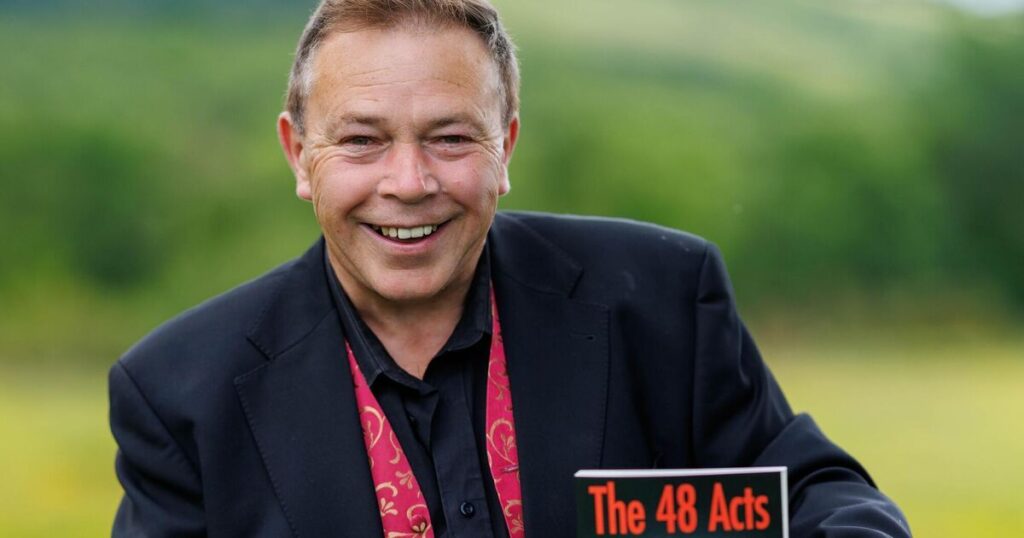IN JULY 2016, I was in the hospital, a married man, a dad of four.
At that time, I’d been living alone in a dark little cottage, and I was very self-isolated. I’d had a number of episodes with alcohol — this was the end of the second one.
When you’re half in, half out of consciousness, doctors can speak as if you’re not there. “It’s hard to see this guy lasting the night,” I heard one say to the other.
I had double pneumonia, acute pancreatitis — I’d never been as sick in my life. I’d been many times in hospital — psychiatric, rehab — that wasn’t new.
Lying there, drifting in and out of consciousness, I said to God, the universe, whoever’s listening: “I don’t want it to end like this, there must be a way out.”
So many unresolved hurts I’d caused that if it ended now, I wouldn’t be able to make amends for. I said: “If you give me one more chance, I’ll find a way to survive, to be well, to be happy to be well.”
Some time during that three-week stay, it’ll sound weird but I felt there was somebody beside me, keeping me alive, to me perfectly real.
The image I associate with him, a kind of whiteness, though I know you can’t see white — but a feeling of almost infinite non-judgement, care, kindness. And I thought if something like this is real, there must be something in me worth saving…
I was nine, 10, when I went to live with my grandparents. I’d been living in Kilkenny, playing soccer, hurling. I’d been very good at a lot of things, like singing at school.
My grandparents were about 20 minutes away by car but it was like going to another country, like something in the 19th century, even though it’s only 50-plus years ago.
My parents were decent people but, by having me with my grandparents, my dad, who worked in a factory in Kilkenny, felt he’d be keeping his connection to the family farm, to what was his birthright.
When I arrived that first time, I felt a sense of extreme isolation, abandonment. It was just for the summer holidays but, after about two years, I was living there practically full-time.
To be in a place where you sense you don’t really belong, or you’re not liked, the trauma started there.
I didn’t always have clean clothes, wasn’t always the cleanest. To a degree, I was ostracised in school.
I remember sitting in class, the smell of dung and the farmyard, others pulling off to the side, snickering… I lived in an authoritarian world that it’s hard to believe existed now.
Looking back on it, going from what was a fairly idyllic life when I was younger to then feeling nobody liked me, I didn’t have the emotional intelligence to understand it but it coloured my whole life.
I did well at college but the more people said, ‘This is good — you’re so good at this,’ I felt an inherent undercurrent of unworthiness and uselessness.
Alcohol became intimately associated with my successes and failures. That spiralled during my 20s. I had an insatiable need to blank out reality with unreality.
But I stopped. I reared my children… I fell back into addiction about 12 years ago. If anything, that was much worse, though there had been an intervening period of zero alcohol.
So in 2016, in the hospital, I didn’t run away this time the minute I felt well enough to go. Other times before, I had — and gone to the nearest pub.
This time, I made a conscious decision, though the craving was as bad — I’m not running, I’m going to stay, I’m going to face it, somehow figure out how to deal with it.
I booked into addiction counselling. I went back to my family home rather than the cottage. The desire was there to drink but what was different: I felt somehow I could deal with it differently.
I’d had four weeks of sobriety and I wanted to hold on to it. For the first time, I felt I was in the right place doing the right thing and I’d be able to do it.
Little things… some time later… riding a horse down a laneway to a field, realising the horse didn’t judge me, only according to whether I fed him or rode him gently.
I realised I was poisoning myself by the way I was looking at things — that this was in me, and I could fix me if I knew how.
And also, seeing my eldest son, a barrister, doing his first induction in court. I looked at him, at my family around me, and thought, ‘You need to give yourself a break — you have achieved an awful lot.’
I realised I had done some good, achieved through love and trying to give my children an upbringing and an education.
Because in active addiction, everything is shame, you’re not good enough.
It was a really strange thing, that presence in the hospital. To this day, I’ve no idea did he exist but also I’m certain he did. And I take it as the turning point.
- Paddy Rafter found a way to live contentedly and in freedom, having from an early age lived a life of addiction and trauma. What helped him to find his way to peace forms the inspiration for his recently published self-help book ‘The 48 Acts’.
- Visit paddyrafter.com for more details.


